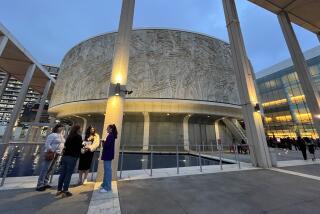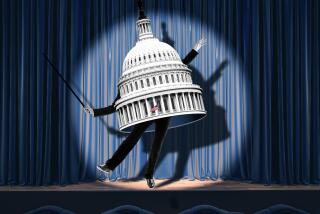Performing arts centers wrestle with debt
PHILADELPHIA — The stage lights might be dimmed this summer at the Kimmel Center for the Performing Arts, but officials at the cash-strapped facility remain upbeat about its future and say its financial picture will brighten next year.
Kimmel, which opened in December 2001 and is home to the Philadelphia Orchestra, posted a $2.2-million operating deficit for the fiscal year ended June 30. The center recently froze salaries, eliminated 12 positions -- about 11% of its staff -- and canceled its Summer Solstice concert series in July and August.
It may be cold comfort to Kimmel officials and fans, but its financial struggles are not unique among performing arts centers -- whether new or old, urban or suburban.
The Wang Center for the Performing Arts in Boston announced in April that it anticipated a debt of about $1 million for the 2004-05 season. The Bushnell Center for the Performing Arts in Connecticut marked its 75th anniversary season with a $1-million deficit, citing lagging ticket sales for its Broadway series -- a factor in budget shortfall for the Kimmel as well. The Miami Performing Arts Center, slated to open this fall, is $67.7 million over budget.
The reasons vary. Factors include the economy, endowment funds made volatile by the stock market, corporations and individuals with less money to donate, city and state funding cuts and smaller audiences spurred by audiences with less money to spend on entertainment.
The Broadway series for 2004-05, which included “The King and I” and Disney’s “On the Record,” garnered low interest at Philadelphia’s Academy of Music, which the Kimmel manages. For the upcoming 2005-06 season, blockbusters “The Lion King” and “Wicked” are expected to attract larger audiences, said Kimmel President Janice C. Price, adding that the past lackluster season was an anomaly for the perennially popular Broadway series.
For the nonprofit Kimmel, however, the major issues are its long-term debt and its too-small endowment.
“The building was supposed to be fully paid for when the doors opened,” Price said. “Instead, we opened with a $30-million debt -- and even with a great interest rate, it’s a problem.” Only $3 million of that loan has been repaid, and the principal and interest costs the Kimmel about $2 million a year. Its endowment, which was expected to be about $50 million when the building opened, is only about half that.
Combine a small pool of cash reserves and a big long-term loan with recent drops in ticket sales and fundraising numbers, and it gets harder to pay down debt. Price said that it’s a situation to which many Americans can relate: facing installment loans and credit card debt without a lot of income or a fat savings account.
Kimmel Center officials are working to drive home the message to funders, board members and the public that it’s no white elephant. It has cut expenses and consistently increased its earned income from such things as rent from resident companies and outside groups, and from doing its own ticketing and program books instead of using outside services like Ticketmaster and Playbill. And there already has been a considerable increase in subscriptions for the coming season over last year, Price said.
The portion of all charitable donations that go to the arts has remained relatively consistent in recent years -- roughly 5% -- but the overall dollars have dropped considerably, said Patrick Madden of the Assn. of Performing Arts Presenters.
“The number is stable as far as our slice of the pie goes, but the pie is smaller,” he said.
Clear Channel Entertainment is upping the performing-arts ante in Boston, where it runs the new Boston Opera House, and in Philadelphia, where plans are in the works to reopen the Art Deco landmark Boyd Theater by fall 2006.
The Wang Center said it will change its programming for the upcoming season, focusing on its own produced and co-produced shows instead of Broadway touring musicals, which are a staple of Clear Channel venues.
More to Read
The biggest entertainment stories
Get our big stories about Hollywood, film, television, music, arts, culture and more right in your inbox as soon as they publish.
You may occasionally receive promotional content from the Los Angeles Times.










